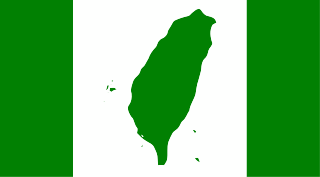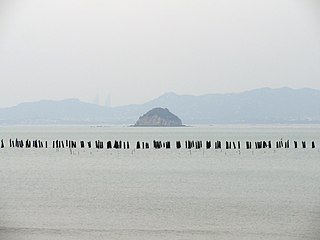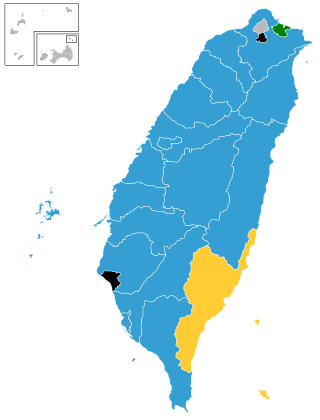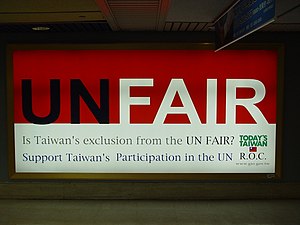
"Mainland China" is a geopolitical term defined as the territory governed by the People's Republic of China, and other territories within Greater China. By convention, the territories that fall outside of the Chinese mainland include:

The Taiwan Solidarity Union (TSU) is a political party in Taiwan which advocates Taiwan independence, and is affiliated with the Taiwanese localization movement. It was officially founded on 12 August 2001 and is considered part of the Pan-Green Coalition. Unlike the Democratic Progressive Party, its larger companion party in the Pan-Green Coalition, the TSU actively campaigns for the creation of a de jure Republic of Taiwan. The future of the party is in doubt after the 2016 elections as the party failed to secure enough votes to be eligible for state funding.

Several proposals for a flag of Taiwan have been initiated by supporters of the Taiwan independence movement to replace the flag of the Republic of China as the national flag flown over Taiwan. Supporters of the movement object to the use of the flag of the Republic of China since it was designed by and is closely associated with the Kuomintang. However, no single flag has been established as the symbol of the independence movement, and supporters of Taiwanese independence, such as the Democratic Progressive Party, have accepted the flag of the Republic of China for the time being and have not pushed for a new flag. The flag of the Republic of China in current use is defined in the 6th article of the Constitution, and amending the Constitution requires a referendum which would only succeed with wide political support. The Republic of China, originally based in mainland China, retreated to Taiwan in 1949 and established its capital in Taipei. The region, now commonly referred to as "Taiwan" in vernacular, retains its official name "Republic of China" and still officially claims territories governed by the People's Republic of China, just as the PRC claims all ROC territories.

Chiang Wei-kuo, also known as Wego Chiang, was the adopted son of Republic of China President Chiang Kai-shek, the adoptive brother of President Chiang Ching-kuo, a retired Army general, and an important figure in the Kuomintang. His courtesy names were Jian'gao (建鎬) and Niantang (念堂). Chiang served in the Wehrmacht before fighting in the Second Sino-Japanese War and Chinese Civil War.

Cimei Township is a rural township in Penghu County, Taiwan. The island is the fifth largest in the Pescadores (Penghu) and the southernmost island in the group. It is the smallest township in Penghu County.
The World Federation of Taiwanese Associations (WFTA) is pro-democracy alliance of Taiwanese Associations from the U.S., Canada, Europe, Japan, Australia, New Zealand and South America. The association meets annually for conferences.

The World Taiwanese Congress is an annual meeting for organizations promoting formal Taiwanese independence. The organization was made in the United States of America in December 2000, and is also based in the United States. It holds its annual meeting in Taiwan.

Tseng Yung-chuan is a Taiwanese politician. He was the Secretary-General of the Kuomintang from 2012 to 2014.

Myanmar–Taiwan relations refers to the international relations between Myanmar and the Republic of China. There are no official relations between the two countries, as Myanmar only recognizes the People's Republic of China.

The Kaohsiung Japanese School is a Japanese international school on the campus of Kaohsiung Municipal Lingya District Jhong-Jheng Elementary School in Lingya District, Kaohsiung, Taiwan in the Republic of China.
Taiwanese Society of Child and Adolescent Psychiatry is a Taiwan-based union of child and adolescent psychiatrists founded in November 7, 1998 with the mission to promote the healthy development of children, adolescents, and families through advocacy, education, and research, and to assist members to meet the professional requirements of child and adolescent psychiatrists throughout their careers.
In Taiwan, the North–South divide refers to the uneven distribution of resources in regard to political, wealth, medical, economic development, education and other aspects across the country over past decades that has drawn the social and cultural differences between Northern Taiwan and Southern Taiwan today.

Kolas Yotaka, formerly Yeh Guan-lin, is an Amis Taiwanese politician and journalist. Since 2020, she has served as spokesperson for the Office of the President under Tsai Ing-wen. Kolas previously served as spokesperson for the Executive Yuan in 2018, the first Taiwanese aboriginal to hold the position.

Philosophy in Taiwan is the set of philosophical traditions in Taiwan, while Taiwanese philosophy is taken to mean philosophical work from the country. Philosophical thought in Taiwan is diverse, drawing influence from Chinese philosophy during Qing rule from the 17th and 18th century, and Western philosophy through the Kyoto School during Japanese rule in the 19th and early 20th century. Taiwanese philosophy took a more endogenous turn during the modern era, with burgeoning philosophical debate regarding Taiwanese Gemeinschaft.

Binlang Islet is an islet located in Lieyu Township, Kinmen County (Quemoy), Taiwan (ROC). The islet can be seen from the shore near Lingshui Lake and from the shore near Shaxi Fort (沙溪堡) in the southwestern part of Lesser Kinmen (Lieyu) as well as from Siming District, Xiamen (Amoy), Fujian, China (PRC). The highest point on the islet is 47 m (154 ft) above sea level.
A four-question referendum was held in Taiwan on 18 December 2021. The vote was originally scheduled to take place on 28 August 2021, but was postponed to December due to the COVID-19 pandemic. All four questions were popular initiatives. According to the Referendum Act, referendums can be held once every two years on the fourth Saturday of August and questions must gather a number of signatures equivalent to 1.5% of eligible voters (280,000) in order to qualify.

Local elections were held in Taiwan on 26 April 1964, the fifth nation-wide elections in post-war Taiwan, electing all 21 mayors of cities and magistrates of counties with a four-year tenure. Fuchien Province, then under military administration, was not up for election.
The history of Cross-Strait relations introduces the historical changes in the relationship between China and Taiwan since the beginning of time. Suspected records of Taiwan in the history of China date back to the earliest times when Yizhou (island) was mentioned in the "Three Kingdoms" or Liuqiu in the "Book of Sui". During the Song dynasty and Yuan dynasties, there was trade between the two sides of the Strait, and in 1281, Kublai Khan established the Penghu Inspection Division, which began to exercise administrative jurisdiction over Penghu, and in 1349, Wang Dayuan documented in Island Yi Zhi Lu that Penghu belonged to Jinjiang County, Quanzhou, and that Liuqiu was one of the overseas countries. The "Dongfan Ji" written by Chen Di in the Ming Dynasty depicts the customs of the aborigines in southwest Taiwan. Since the 1620s, cross-strait relations have been influenced by the Dutch, the Spanish, the Han Chinese, the Manchus, and the Japanese, and mainland China and Taiwan have either unified or separated, with ups and downs.















